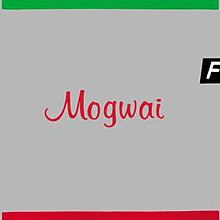Happy_Songs_for_Happy_People
Happy Songs for Happy People
2003 studio album by Mogwai
Happy Songs for Happy People is the fourth studio album by Scottish post-rock band Mogwai.
| Happy Songs for Happy People | ||||
|---|---|---|---|---|
 Digital cover art. Physical release covers are rendered on a mirrored surface. The remainder of the album title is printed on the reverse side, reading "Happy Songs or Happy People". | ||||
| Studio album by | ||||
| Released | 17 June 2003 (2003-06-17) | |||
| Studio | CaVa Studios (Glasgow, Scotland) | |||
| Genre | ||||
| Length | 41:52 | |||
| Label | ||||
| Producer |
| |||
| Mogwai chronology | ||||
| ||||
| Aggregate scores | |
|---|---|
| Source | Rating |
| Metacritic | 85/100[1] |
| Review scores | |
| Source | Rating |
| AllMusic | |
| Alternative Press | 5/5[3] |
| The Guardian | |
| Mojo | |
| NME | 8/10[6] |
| Pitchfork | 7.1/10[7] |
| Q | |
| Rolling Stone | |
| The Rolling Stone Album Guide | |
| Uncut | |
Happy Songs for Happy People represents a further evolution of Mogwai's toned down, more electronic sound: all songs are based on electric guitars and live drums, but synthesizers are used frequently and often take the main stage on this album, with strings and piano also making the occasional appearance.
Mogwai's usual vocalist Stuart Braithwaite does not sing on this album. Instead, Barry Burns ("Hunted by a Freak", "Killing All the Flies") and John Cummings ("Boring Machines Disturbs Sleep") provide the vocals.
The CD release of Happy Songs for Happy People contains a demo version of Cubase and the individual tracks for each instrument in "Hunted by a Freak" allowing remixing and reconstructing of the song.
The pre-release MP3s of the album circulating on the net had a sample of Happy Tree Friends cartoon main theme mixed in at the end of the last track.
A computer-animated video was released for the song "Hunted by a Freak", depicting a person throwing pets to their death.
In 2009 it was awarded a gold certification from the Independent Music Companies Association which indicated sales of at least 100,000 copies throughout Europe.[12]
The song "I Know You Are But What Am I?" is used as the closing of Episode 8, Season 1 of the TV show Person of Interest and also appears on The Wicker Man motion picture soundtrack. The song "Kids Will Be Skeletons" was featured in the 2015 video game Life Is Strange as well as episodes of the Netflix series After Life.
| No. | Title | Length |
|---|---|---|
| 1. | "Hunted by a Freak" | 4:18 |
| 2. | "Moses? I Amn't" | 2:59 |
| 3. | "Kids Will Be Skeletons" | 5:29 |
| 4. | "Killing All the Flies" | 4:35 |
| 5. | "Boring Machines Disturbs Sleep" | 3:05 |
| 6. | "Ratts of the Capital" | 8:27 |
| 7. | "Golden Porsche" | 2:49 |
| 8. | "I Know You Are but What Am I?" | 5:17 |
| 9. | "Stop Coming to My House" | 4:53 |
| Total length: | 41:52 | |
All tracks are written by Mogwai (Dominic Aitchison, Stuart Braithwaite, Martin Bulloch, Barry Burns and John Cummings)
| No. | Title | Length |
|---|---|---|
| 10. | "Sad DC" | 4:34 |
| Total length: | 46:26 | |
|
|
| Chart (2003) | Peak position |
|---|---|
| French Albums (SNEP)[13] | 91 |
| Scottish Albums (OCC)[14] | 22 |
| UK Albums (OCC)[15] | 47 |
| UK Independent Albums (OCC)[16] | 6 |
| US Billboard 200[17] | 182 |
| US Heatseekers Albums (Billboard)[18] | 9 |
| US Independent Albums (Billboard)[19] | 13 |
- "Reviews for Happy Songs For Happy People by Mogwai". Metacritic. Retrieved 8 February 2011.
- Phares, Heather. "Happy Songs for Happy People – Mogwai". AllMusic. Retrieved 8 February 2011.
- "Mogwai: Happy Songs for Happy People". Alternative Press (181): 94. August 2003.
- Peschek, Dave (13 June 2003). "Mogwai: Happy Songs for Happy People". The Guardian. Retrieved 14 May 2016.
- Jonze, Tim (13 June 2003). "Mogwai: Happy Songs For Happy People". NME. Archived from the original on 7 June 2014. Retrieved 8 February 2011.
- Carr, Eric (18 June 2003). "Mogwai: Happy Songs for Happy People". Pitchfork. Retrieved 8 February 2011.
- Blashill, Pat (24 July 2003). "Mogwai: Happy Songs For Happy People". Rolling Stone. Archived from the original on 15 February 2009. Retrieved 14 May 2016.
- Sheffield, Rob (2004). "Mogwai". In Brackett, Nathan; Hoard, Christian (eds.). The New Rolling Stone Album Guide (4th ed.). Simon & Schuster. p. 551. ISBN 0-7432-0169-8.
- "color". www.impalamusic.org. Archived from the original on 27 December 2015.
- "Lescharts.com – Mogwai – Happy Songs for Happy People". Hung Medien. Retrieved 23 June 2018.
- "Official Scottish Albums Chart Top 100". Official Charts Company. Retrieved 23 June 2018.
- "Official Albums Chart Top 100". Official Charts Company. Retrieved 23 June 2018.
- "Official Independent Albums Chart Top 50". Official Charts Company. Retrieved 17 July 2018.
- "Mogwai Chart History (Billboard 200)". Billboard. Retrieved 23 June 2018.
- "Mogwai Chart History (Heatseekers Albums)". Billboard. Retrieved 23 June 2018.
- "Mogwai Chart History (Independent Albums)". Billboard. Retrieved 23 June 2018.